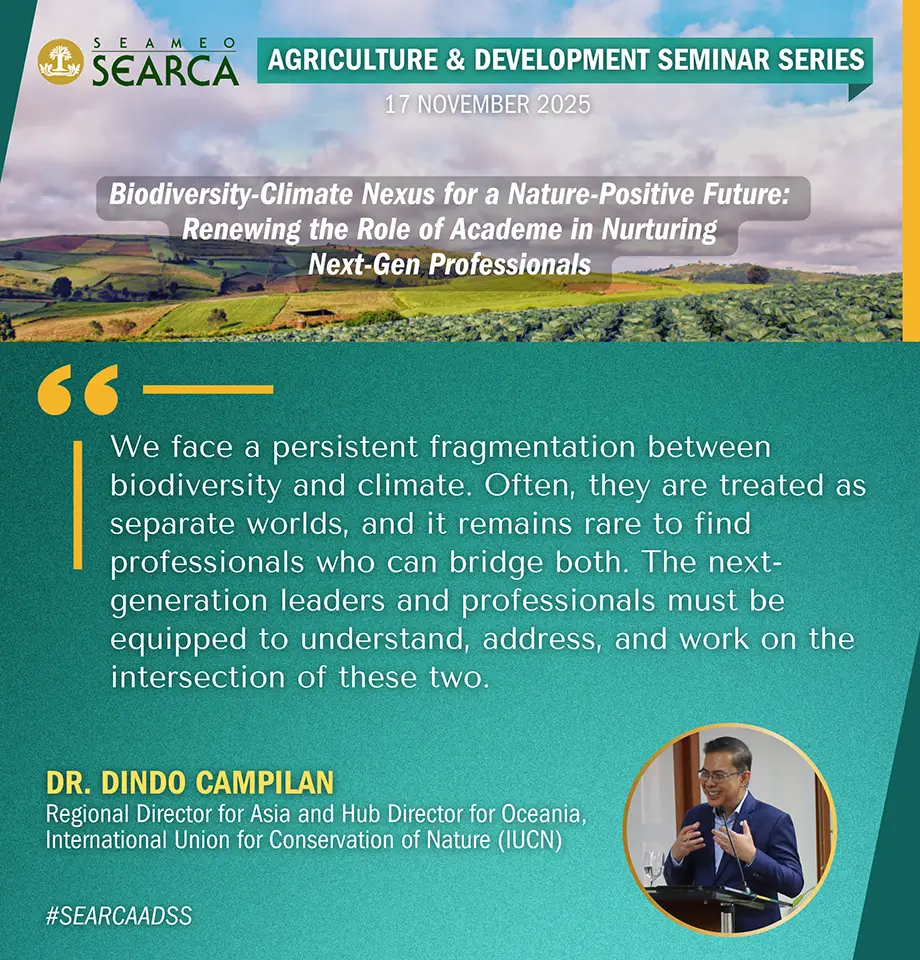LOS BAÑOS, Philippines—A seminar hosted by the Southeast Asian Regional Center for Graduate Study and Research in Agriculture (SEARCA) highlighted the need for next-generation professionals to be equipped and to engage in the biodiversity-climate nexus.
Speaking at the SEARCA Agriculture and Development Seminar Series (ADSS) on 17 November 2025, Dr. Dindo Campilan of the International Union for Conservation of Nature (IUCN) delivered his lecture titled "Biodiversity-Climate Nexus for a Nature-Positive Future: Renewing the Role of Academe in Nurturing Next-Generation Professionals." He emphasized the urgent need to bridge gaps between biodiversity and climate action, which are areas often treated separately despite their deep interconnection.
"We face a persistent fragmentation between biodiversity and climate. Often, they are treated as separate worlds, and it remains rare to find professionals who can bridge both," said Campilan, who serves as IUCN Regional Director for Asia and Hub Director for Oceania.
"The next-generation leaders and professionals must be equipped to understand, address, and work on the intersection of these two," he asserted.
Dr. Campilan added that key challenges also include gaps in academic programs in responding to shifting real-world priorities and the limited pool of fit-for-purpose talent to work at the biodiversity–climate nexus.
"Global science is clear. We no longer have to debate about it. Climate and biodiversity are two sides of the same coin," Campilan said.
He explained that human activities driving biodiversity loss are often the same drivers of climate change. Therefore, solutions must also be linked. He emphasized that "You cannot address one without the other."
Referring to a landmark 2020 paper in Nature, Campilan stressed that traditional conservation approaches will not be enough.
"It's no longer enough to just restore and protect. The rate of biodiversity loss has outpaced nature's ability to recover," he said.
"We need to do more. That's why we need to bend the curve," he added, noting that this involves systemic changes in production and consumption, not just conservation interventions.
Campilan concluded his lecture by challenging academic institutions to take an active role in training future professionals who can work across climate and biodiversity issues. Given the surging global demands for climate and nature work, he urged universities to equip students with skills that match emerging scientific and policy frontiers.
"This is the opportunity moving forward, especially for young professionals and students," he said.
The ADSS is SEARCA's flagship seminar series that encourages the presentation and discussion of development and research issues, as well as their implications for the sustainable transformation of Southeast Asian agricultural systems through innovation. It aims to foster dynamic discussions and knowledge sharing within and beyond the LBSC.

